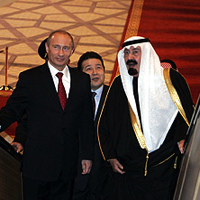It is time for President Barack Obama to initiate an informal, tripartite dialogue with King Abdullah of Saudi Arabia and Russian President Dmitry Medvedev about stabilizing the global price of oil. Leaving the decision in the hands of speculators has not served the interests of any of these three countries. At midweek, the price, while coming down, still stood higher than $100 a barrel, with Brent crude currently trading at roughly $112 a barrel.
Counterintuitively, oil producers are hoping the price descends further, because if oil gets too expensive, customers begin looking for other sources of energy. Last week, speaking with Fareed Zakaria on CNN, Prince Al-Waleed bin Talal, a nephew of the Saudi king, admitted that Saudi Arabia's target price for oil is "between $70 and $80 [per barrel], not only to help the West, but also to help ourselves. We don't want the West to go and find alternatives, because, clearly, the higher the price oil goes, the more you have incentive to go and find alternatives." At the same time, the 23 percent increase in the price of Brent crude oil this year also could also impact natural gas markets, since the prices for long-term natural gas deliveries are linked to oil prices. This not only means that the "European contract price of gas is going up," but also that, "[European] utilities won't sign new oil-linked contracts" and will begin to look for alternatives as well, according to Thierry Bros, a senior analyst at Société Générale in Paris
Certainly, the United States has strong incentives for bringing the oil price down. An anemic economic recovery is threatened by high prices for fuel that cut deeply into household budgets and raise consumer prices. That, in turn, makes Obama politically vulnerable heading into the 2012 election campaign. Lower oil prices also reduce the ability of certain oil-producing states, such as Iran and Venezuela, to engage in mischief in the global arena. According to Credit Suisse, Iran needs oil prices to stay above $100 per barrel in order to balance its budget, which uses oil revenues to subsidize increased social welfare spending at home. Venezuela's break-even point is higher still, at $110 per barrel. Saudi unease about Iran's desire for hegemony in the Persian Gulf reinforces the incentive to reduce Iran's ability to derive income from oil sales. And while high oil prices are helping to close Russia's budget deficit, economists in Medvedev's circle of advisers remain concerned that Russia's addiction to oil revenues continues to inhibit the country's efforts to create a more robust economy. Indeed, despite the rise in oil prices, Russia's GDP growth slowed in the first quarter of 2011, highlighting the growing disconnect between oil prices and Russian economic growth. This has led Finance Minister Alexei Kudrin to conclude that oil, which drove economic expansion during the administration of Vladimir Putin, has "exhausted its potential" to serve as a "locomotive for growth."

